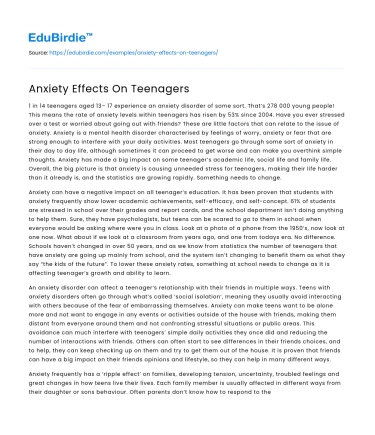1 in 14 teenagers aged 13– 17 experience an anxiety disorder of some sort. That’s 278 000 young people! This means the rate of anxiety levels within teenagers has risen by 53% since 2004. Have you ever stressed over a test or worried about going out with friends? These are little factors that can relate to the issue of anxiety. Anxiety is a mental health disorder characterised by feelings of worry, anxiety or fear that are strong enough to interfere with your daily activities. Most teenagers go through some sort of anxiety in their day to day life, although sometimes it can proceed to get worse and can make you overthink simple thoughts. Anxiety has made a big impact on some teenager’s academic life, social life and family life. Overall, the big picture is that anxiety is causing unneeded stress for teenagers, making their life harder than it already is, and the statistics are growing rapidly. Something needs to change.
Anxiety can have a negative impact on all teenager’s education. It has been proven that students with anxiety frequently show lower academic achievements, self-efficacy, and self-concept. 61% of students are stressed in school over their grades and report cards, and the school department isn’t doing anything to help them. Sure, they have psychologists, but teens can be scared to go to them in school when everyone would be asking where were you in class. Look at a photo of a phone from the 1950’s, now look at one now. What about if we look at a classroom from years ago, and one from todays era. No difference. Schools haven’t changed in over 50 years, and as we know from statistics the number of teenagers that have anxiety are going up mainly from school, and the system isn’t changing to benefit them as what they say “the kids of the future”. To lower these anxiety rates, something at school needs to change as it is affecting teenager’s growth and ability to learn.
Save your time!
We can take care of your essay
- Proper editing and formatting
- Free revision, title page, and bibliography
- Flexible prices and money-back guarantee
An anxiety disorder can affect a teenager’s relationship with their friends in multiple ways. Teens with anxiety disorders often go through what’s called ‘social isolation’, meaning they usually avoid interacting with others because of the fear of embarrassing themselves. Anxiety can make teens want to be alone more and not want to engage in any events or activities outside of the house with friends, making them distant from everyone around them and not confronting stressful situations or public areas. This avoidance can much interfere with teenagers’ simple daily activities they once did and reducing the number of interactions with friends. Others can often start to see differences in their friends choices, and to help, they can keep checking up on them and try to get them out of the house. It is proven that friends can have a big impact on their friends opinions and lifestyle, so they can help in many different ways.
Anxiety frequently has a ‘ripple effect’ on families, developing tension, uncertainty, troubled feelings and great changes in how teens live their lives. Each family member is usually affected in different ways from their daughter or sons behaviour. Often parents don’t know how to respond to their child’s behaviours, as most describe their experience as “walking on eggshells” around their child with anxiety. Tension between the child and their parents can cause problems bonding and communicating, which can have a big impact on the families trust and connection with each other. Although teenagers usually don’t want to talk to their parents about what’s going on in their life, and as parents don’t realise this they try to push it by wanting to know everything. Parents can have a major part in helping their child cope with anxiety by just letting them be and grow and can help by slowly trying to talk to them about it, when there child is ready.
Mental health is a frequent thing that happens in nearly all teenagers, anxiety being one of the most common, whether its irregular or regular feelings everyone can experience it. It’s affecting teenagers life in school and with their family and friends, and as the statistics are growing, something needs to change!






 Stuck on your essay?
Stuck on your essay?

